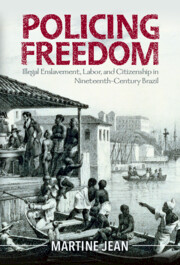Book contents
- Policing Freedom
- Afro-Latin America
- Policing Freedom
- Copyright page
- Dedication
- Contents
- Figures
- Maps
- Tables
- Acknowledgments
- Introduction
- 1 The Politics of Slavery, Race, Nation, and Prison Building
- 2 Confinement, Labor, and Citizenship
- 3 Prison Labor and the Politics of Slavery
- 4 Disciplining Children and Engendering Racialized Citizenship
- 5 Adelino Mwissicongo and the Afterlife of Emancipation
- Conclusion: Slavery’s Punitive Afterlife
- Appendices
- Bibliography
- Index
5 - Adelino Mwissicongo and the Afterlife of Emancipation
Published online by Cambridge University Press: 03 August 2023
- Policing Freedom
- Afro-Latin America
- Policing Freedom
- Copyright page
- Dedication
- Contents
- Figures
- Maps
- Tables
- Acknowledgments
- Introduction
- 1 The Politics of Slavery, Race, Nation, and Prison Building
- 2 Confinement, Labor, and Citizenship
- 3 Prison Labor and the Politics of Slavery
- 4 Disciplining Children and Engendering Racialized Citizenship
- 5 Adelino Mwissicongo and the Afterlife of Emancipation
- Conclusion: Slavery’s Punitive Afterlife
- Appendices
- Bibliography
- Index
Summary
This chapter centers the liberated African Adelino Mwissicongo’s biography from slavery to apprenticeship and from apprenticeship to incarceration for theft in the context of the struggles for “full freedom” by liberated Africans between 1850 and 1864, the radical transformation of Rio’s urban economy and social landscape, and the discourse on vagrancy and criminality that distinctly identified free people of color and Portuguese immigrants as objects of police surveillance in the last decades of slavery in Brazil. The chapter places Adelino’s story in relation to the problem of petty criminality and poverty as Rio underwent a rapid demographic transformation that saw a significant decrease in its slave population to under 17 percent by 1872, according to the first national census. I argue that the penitentiary became complicit in constructing a pathologizing discourse that branded liberated African men and women as “incorrigible” by collecting and providing documentary support for the denial or concession of freedom certificates.
Keywords
- Type
- Chapter
- Information
- Policing FreedomIllegal Enslavement, Labor, and Citizenship in Nineteenth-Century Brazil, pp. 239 - 287Publisher: Cambridge University PressPrint publication year: 2023

